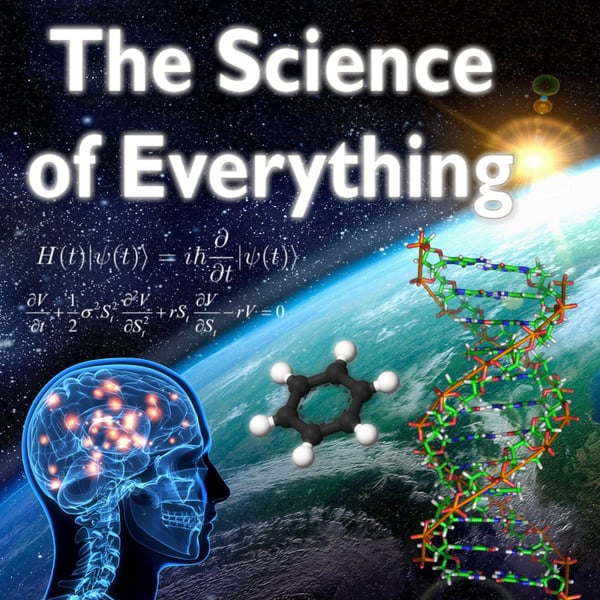Episode 118: Cell Signalling
The Science of Everything Podcast
James Fodor
4.8 • 750 Ratings
🗓️ 31 May 2021
⏱️ 59 minutes
🧾️ Download transcript
Summary
Transcript
Click on a timestamp to play from that location
| 0:00.0 | Oh, wow, oh, oh, wow, oh, wow, oh, wow. |
| 0:13.0 | Oh, wow. |
| 0:15.0 | Oh, wow. Hello, you're all listening to the Science of Everything podcast, episode 118, cell signaling. |
| 0:39.7 | I'm your host of James Fodor. |
| 0:41.5 | So in this episode, we are going to talk about how cells communicate with each other in multicellular organisms, which is cell signaling. |
| 0:49.0 | In particular, I'm going to talk about the different types of signaling molecules and the receptors that detect them on |
| 0:54.4 | the surface of the cells mostly. And we're going to look at the difference between intra |
| 0:59.7 | and extracellular receptors and some of the main types of receptors, including G-protein, |
| 1:05.2 | coupled receptors and enzyme-linked receptors, and also the signal transduction process that |
| 1:10.2 | occurs after the initial signal has been |
| 1:13.1 | received on the outside of the cell, as well as talking about the purpose and overall |
| 1:18.8 | structure and function of cell signaling and the relevant pathways. So recommended pre-listing |
| 1:25.7 | for this is episode 116, the cell membrane, |
| 1:30.3 | because we'll be building on some concepts relating to that. Without further ado then, let's |
| 1:34.7 | make a start and begin by talking about what cell signaling is and why it matters. So this topic |
| 1:40.1 | is one that is, I think, relatively neglected in cell biology or biochemistry education. |
| 1:47.0 | I mean, you know, it's there, but it's not something that gets brought up as often, |
| 1:51.2 | certainly in the public consciousness or even in, I think, intro courses compared to, say, |
| 1:56.7 | looking at the structure of DNA and protein synthesis and genetics and stuff like that. |
| 2:03.3 | The whole deal of how cells communicate with each other is often sort of not mentioned or brushed |
| 2:07.8 | over fairly quickly. So this topic doesn't get as much attention, but it actually is extremely |
| 2:11.5 | important because it comes up again and again in studying lots of different systems. |
... |
Please login to see the full transcript.
Disclaimer: The podcast and artwork embedded on this page are from James Fodor, and are the property of its owner and not affiliated with or endorsed by Tapesearch.
Generated transcripts are the property of James Fodor and are distributed freely under the Fair Use doctrine. Transcripts generated by Tapesearch are not guaranteed to be accurate.
Copyright © Tapesearch 2025.

